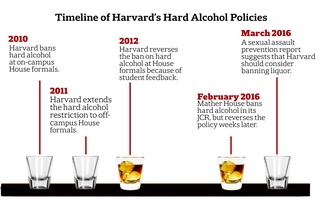The battle over the relationship between drinking and campus social ills reemerged at Harvard last week when Mather House banned hard alcohol consumption in its Junior Common Room, a frequent campus party space, with a goal of making parties “safer.” Students and House administrators met in the wake of this decision, but the House heads and resident dean implemented the policy without first consulting students.
While encouraging safer parties is clearly an important goal, we believe that Mather erred in both the conception and implementation of this initiative. Banning hard alcohol is not likely to lead to safer partying, and the decisions to enact such a ban demands far more student input than occurred in this case.
It is no secret that the College faces serious problems with student social spaces. The entrenched presence of final clubs and the lack of similarly well-appointed alternatives both on campus and off make for a less than ideal social dynamic.
Over the past two years, Harvard administrators have acknowledged as much, particularly by focusing on Harvard’s exclusive off-campus social spaces and promoting more inclusive alternatives. Mather’s new ban on hard alcohol in its JCR, however, will only impede the creation of the inclusive social settings that its authors are striving to promote.
For better or worse, hard alcohol plays a significant role in college social life. Banning its consumption in the Mather JCR will discourage students from hosting parties there and work against the growing desire for a thriving, House-centered social experience. This result is especially concerning given the College’s emphasis on the House system as a pillar of students’ social experiences. If true to its values, Harvard should be looking to bolster the House social experience rather than limit it.
Granted, hard alcohol brings with it serious safety concerns. But if anything, the safest places for consumption are House common spaces. These are often more easily accessible for security and in view of other students. Alternative drinking spaces, such as students’ dorm rooms, pose much greater risk.
Beyond the substantive issues of Mather's new policy, the decision to devise and announce it without soliciting student input is also concerning. Students are at the forefront of this issue and have a significant stake in any initiative that seeks to regulate on campus social life. Consultation after the fact is no substitute for making students partners in the decision making process.
Ultimately, Mather's more limited hard alcohol ban shares the same basic flaws of sweeping policies at peer institutions like Dartmouth: It risks making student alcohol consumption more unsafe, not less. At Harvard, this policy also discourages the use of more inclusive social venues. In the future, we hope that administrators will be skeptical of such changes, and at the very least consult students before adopting initiatives which may undermine shared goals for campus social life.
Read more in Opinion
Letter to the Editor: Clinton and Appreciating HistoryRecommended Articles
-
Drink Up, MenMore good news for drinkers: A Harvard study has linked moderate alcohol consumption to a 40 percent reduction in the
-
An Overlooked Double StandardIt’s like being told your brother is allowed to go out at night without a chaperone because boys will be boys, but you’re not because you’re a well-behaved young lady.
-
Mather Bans Hard Alcohol in Junior Common RoomDuring a year in which the safety and accessibility of the College’s social scene has dominated campus conversation, a new policy in Mather House outlaws residents from consuming hard alcohol in the Junior Common Room, a space students often use to host parties.
-
 After Shaky Past, Harvard’s Grip on Hard Alcohol Could Tighten
After Shaky Past, Harvard’s Grip on Hard Alcohol Could Tighten -
 Adams House Institutes Temporary Alcohol Ban in House Party Spaces
Adams House Institutes Temporary Alcohol Ban in House Party Spaces













